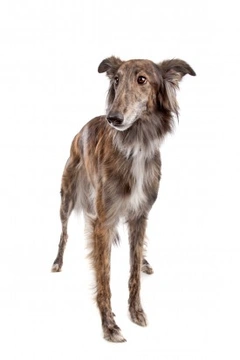
What is Lotus Syndrome in Dogs?
Sadly, Lotus syndrome is fatal and puppies born with the condition have no chance of surviving with some pups being stillborn. The problem is that puppies with the disorder lack the instinct to suck and have great difficulty in breathing. Pups are born with their hind legs tucked up and folded under their stomachs with their front legs stretched out under their chests with their wrists touching each other which is why the disorder is called "lotus".
Puppies born with the condition also have many bone deformities one of which is a twisted spine (scoliosis) and all pups with Lotus Syndrome are lethargic lacking in energy and reluctant to make any movements at all. However, some puppies with Lotus gene disorder do not show any joint or bone deformities and look perfectly normal.
Researchers Believe Lotus Syndrome to be Similar to FADS
One breed prone to the condition is the Silken Windhound and only one puppy in a litter may be affected whereas all the others are healthy and never show any signs of Lotus Syndrome. A lot of research has been carried out in the States at the University of Pennsylvania where studies have led researchers to believe the disorder is much the same or very similar to a human condition known as "fetal akinesia deformation sequence" or FADS. Children born with the condition demonstrate the same clinical symptoms as puppies that have Lotus Syndrome and this includes problems in breathing.
The Cause of Lotus Syndrome Remains Unknown
Nobody actually knows what causes this disorder although there are some theories going around as to why certain breeds and only a few puppies appear to be born with the condition. Researchers in America have focussed on Silken Windhounds for the majority of their studies and with breeders cooperation, a lot of progress is being made in understanding Lotus Syndrome in dogs. One of the ultimate goals of the research is to establish a DNA marker test in order to identify dogs that may be carrying the offending gene with a view to breeding it out completely. Unfortunately, breeders living outside the USA are not able to take part in the research due to the strict regulations on transporting animals into the States.
Without a DNA test marker being developed to spot dogs with the Lotus Syndrome gene, it is impossible to know whether healthy stock is being used to produce puppies. As such many millions of dollars are being invested in the research in a quest to achieve this goal so that a test would be made available to all and the "Lotus pup" gene eventually eliminated altogether through well informed breeding programs.
Breeds That are Known to Affected
The breed that appears to be the most affected by Lotus Syndrome is the Silken Windhound with American breeders being quite concerned at the number of puppies being born with the condition. Although, this figure is somewhat obscured because it can be hard to confidently say that any sudden deaths in puppies as well as still born pups were due to the Lotus gene being present. Many breeders in America now send their dead pups to the University of Pennsylvania so that tests can be carried out to see if the gene is present or not and to establish the cause of their death.
How Can Lotus Syndrome be Prevented
The only real way of preventing this nasty and devastating disorder in its tracks is for breeders not to use dogs that are known to be affected by the condition in any breeding programs. The sad truth is that without a DNA marker test to identify the condition, even the most reputable and well meaning breeder would not be able to say whether one of their dogs has the condition or not.
This naturally puts breeders in an impossible position. However, with so much research being carried out at the University of Pennsylvania, hopefully a marker test will appear on the scene in the not too distant future. Once this goal has been achieved, then and only then could dogs with the condition be eliminated from breeding programs.
Conclusion
Lotus Syndrome is a devastating condition where puppies are either born stillborn or with other deformities and a real difficulty in breathing. Puppies do not survive if they have the condition and the strange thing is that not all puppies in a litter would be affected with some of them being born completely healthy and without the Lotus pup gene. The one breed that appears to be the most affected is the Silken Windhound but researchers believe some other breeds too may be affected but until there is a DNA test marker available, it is impossible to identify any dogs that are affected with this disorder.



